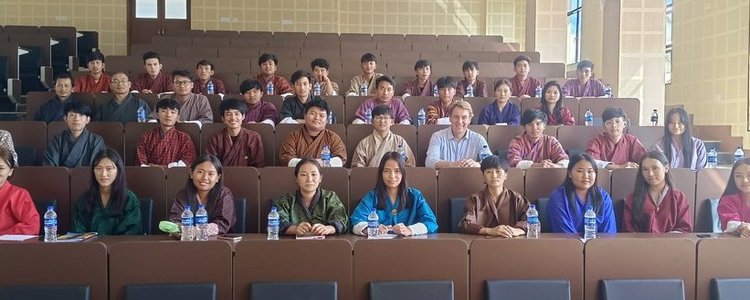The project Strengthening capacity of Higher Engineering Education for Sustainable Buildings abbreviated as HEESeB is an academic collaboration between Jigme Namgyel Engineering College (JNEC), Royal University of Bhutan and Universität Innsbruck, Austria. HEESeB was officially launched on 1st February 2023. This collaboration aims to promote sustainable and resilient buildings in Bhutan, through extensive research and collaboration. The academic partnership will formulate a certificate programme in Timber Engineering for Energy Efficient Buildings (TEEEB) at JNEC aiming to generate qualified manpower for sustainable and resilient infrastructure planning, design, construction and maintenance of timber structure. It shall also lead to synergy of emerging technologies with natural building materials and age-old traditional practices through the transfer of knowledge and skills.
The overall project goal is as follows:
1. Diversify academic programmes:
- Develop new academic programme on timber engineering for energy efficient buildings,
- Develop two new courses related to gender, equity and diversity sensitive science, technology, engineering and mathematics (STEM); building modelling and simulation, and HVAC
2. Improve instructional support services at JNEC
- Offer short-term courses in collaboration with UIBK in the field of gender, equity, and STEM
- Professional development in operation and management of timber engineering laboratory equipment.
3. Knowledge and experience sharing to enhance teaching and research capacity for JNEC through staff and student exchange.
Within one year of project implementation, the project has achieved the following outcomes:
- A need analysis of timber engineering course was conducted through survey. A total of 61 respondents participated in the survey. The findings of the survey were presented to a groups of experts from both the industry as well as from academia.
- Based on the needs analysis, the project team had designed a course structure that is would benefit JNEC, the employing organisations, and the country as a whole. The course would cover Introduction to Timber; Timber processing and quality control; Timber Construction practices/techniques; Maintenance and retrofitting; Energy-efficient Buildings.
- A four-day training of trainers (ToT) course on Gender Sensitive STEM Teaching was conducted for the science teachers at JNEC. The focus of the course was on empowering women in STEM fields and strategies to overcome obstacles. Participants actively shared their perspectives using an Inquiry-based learning approach and engaged in discussions
- A two-day course on Building Energy Efficiency was attended by 46 participants from JNEC. Over the two days, interactive discussions revolved around building aspects for improving the efficiency, basics to high end building energy simulation, mainly focusing on Building Physics, HVAC and Simulation.
- A one day course on timber engineering was organised at JNEC which was attended by 46 staff and students. The course focussed on two main topics: building physics in construction and structural timber engineering. These discussions encompassed a range of crucial aspects, notably fire protection, sound insulation, thermal insulation, and moisture protection
- A 10-day ToT was organised at UIBK which was attended by 10 staff from JNEC. These staff will be responsible to teach when the course on Timber Engineering is being launched at JNEC in July 2024.
